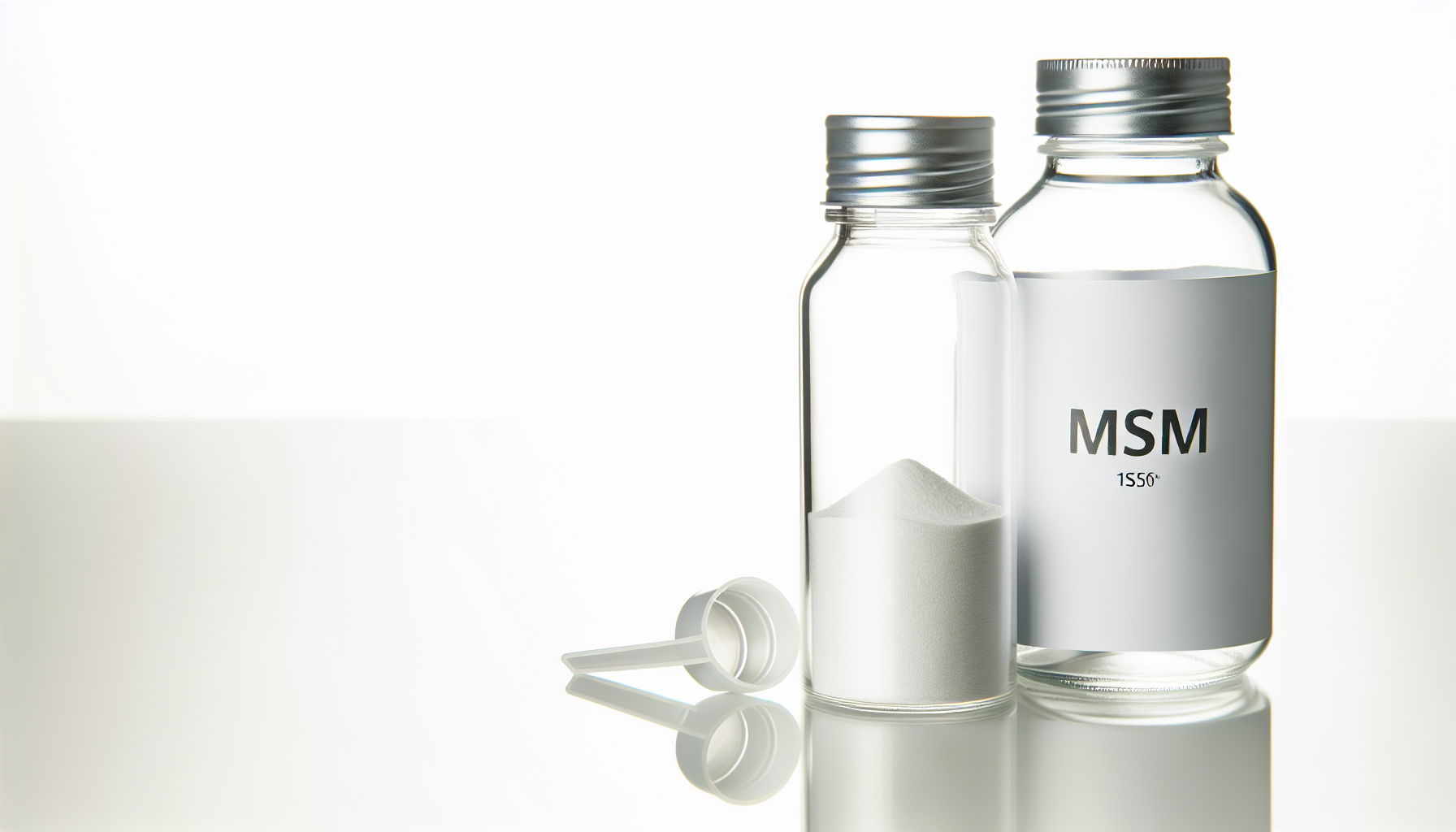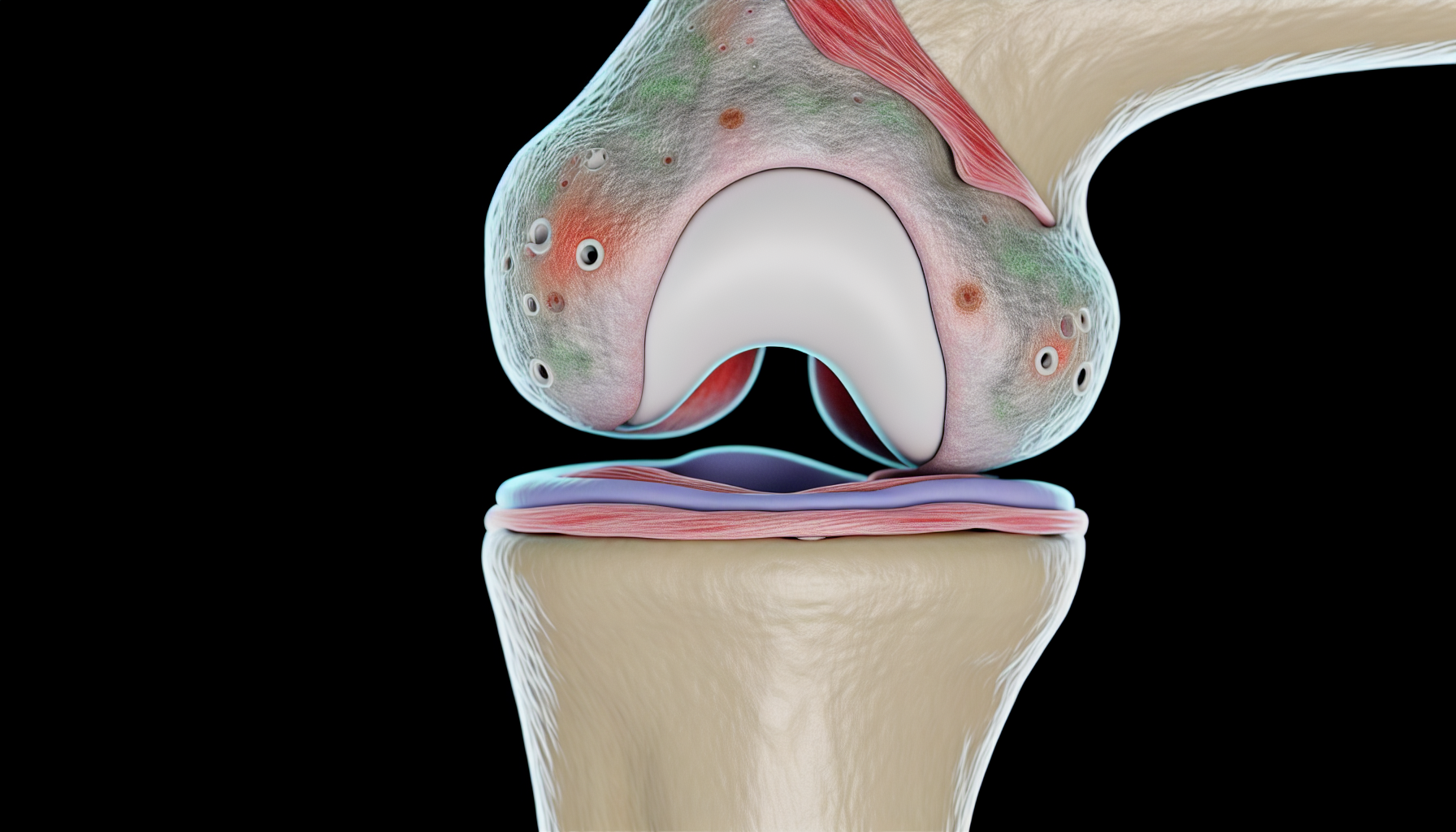Wondering what is the best source of MSM? Are you curious about MSM, also known as methylsulfonylmethane? You're not alone! This remarkable compound, often overshadowed by more famous nutrients, is crucial to our health and well-being. MSM is a naturally occurring sulfur compound found in all living organisms. It's not just a simple nutrient; it's a key player in maintaining our body's structural proteins, like collagen and keratin, making it essential for healthy skin, hair, and nails. But that's just the tip of the iceberg. MSM's role extends to reducing inflammation, enhancing antioxidant defenses, and supporting immune function. So, whether you're a fitness enthusiast, dealing with allergies, or just looking to maintain your overall health, understanding MSM and how to effectively include it in your diet or supplement regime could be a game-changer. Join us as we dive into the world of MSM, exploring the best sources and how to optimize its benefits for your unique health journey.
Key Takeaways
- MSM is naturally found in various foods such as leafy greens, protein-rich foods, fruits, and whole grains, but levels can be inconsistent, making it challenging to obtain sufficient amounts solely from diet.
- Supplementation with MSM is common for ensuring an adequate intake, with a daily dosage ranging from 50 mg to 3 g, depending on individual health goals and tolerance, and quality varies among products.
- Beyond its nutritional benefits, MSM is utilized in complementary and alternative medicine for sports nutrition recovery and allergy symptom relief, and it shows potential in treating joint degeneration and reducing inflammation.
Unveiling the Top Natural Sources of MSM

MSM, a naturally occurring compound, can be found in various foods, including fresh vegetables and dairy products. The beauty of MSM is that it’s a part of our daily diet, making it a readily accessible component for those seeking to benefit from its numerous health advantages. However, the actual content can vary, posing a challenge for individuals seeking to maximize their intake through dietary sources.
Leafy Green Vegetables: A Rich Source
Regarding natural sources of MSM, leafy green vegetables reign supreme. These nutrient-dense foods are known for their high MSM content, which can also be found in dietary supplements.
A diverse intake of leafy greens enhances MSM absorption through the plant’s root systems, thus providing crucial nutrients for our overall well-being.
Protein-Rich Foods: Supporting Joint Health

Protein-rich foods such as:
- turkey
- beef
- eggs
- fish
- legumes
are another excellent source of MSM. These foods provide the essential amino acids required for muscle recovery and contribute to reducing inflammation and muscle pain, crucial factors in supporting joint health.
Ingesting these protein-dense foods can result in numerous health advantages like better skin health, lessened allergy symptoms, and potential hair growth promotion, all of which contribute to improved human nutrition.
Fruits and Whole Grains: An Alternative Intake
If you’re not a fan of leafy greens or protein-rich foods, don’t fret. Fruits and whole grains offer an alternative intake of MSM, contributing to a balanced diet. Some fruits that are high in MSM include:
- Alfalfa sprouts
- Apples
- Raspberries
- Tomatoes
Whole grains are also a good source of MSM. However, be aware that the MSM content in these foods can diminish as a result of cooking and processing.
The Role of MSM Supplements in Daily Health Regimens

Exploring the world of dietary supplements can be overwhelming, but when it comes to enhancing joint health, easing muscle soreness, or supporting hair growth, MSM (methylsulfonylmethane) supplements stand out. While leafy green vegetables and protein-rich foods offer this naturally occurring compound, the amounts are often minimal. Enter MSM supplements – your reliable source for a concentrated dose of this organic sulfur, pivotal in human nutrition and known for its anti-inflammatory properties.
Choosing and Using MSM Supplements Effectively
MSM supplements, versatile in forms like capsules, powders, and topical creams, cater to everyone’s unique needs. Whether you’re dealing with joint pain, seasonal allergies, or looking for muscle recovery support, there’s an MSM form for you. Capsules offer convenience, powders provide flexibility in dosage, and creams target local areas, such as sore muscles or skin irritation. But remember, the absorption rate can vary across these forms.
Finding the right dosage is key. Typically, MSM daily dosages range from 50 mg to 3 g. In times of increased stress or illness, some may benefit from slightly higher doses, given MSM’s safety profile. Always consult a healthcare professional, especially if you have conditions like rheumatoid arthritis or osteoarthritis.
Selecting Top-Quality MSM Supplements
Quality is paramount when choosing an MSM supplement. A high-quality product should contain pure MSM and undergo stringent third-party testing for purity and potency. It should also meet the Food and Drug Administration's regulatory standards for safety.
In our comprehensive review, "MSM Marvels: Unlocking the Secrets of The Five Best MSM Supplement Game-Changers," we delve into the top products on the market. Brands like Doctor’s Best, NOW Foods, and Jarrow Formulas meet and exceed these criteria. We'll guide you through choosing a supplement that aligns with your health goals, whether to relieve joint pain, reduce muscle soreness, or improve skin quality. For a link to this detailed review, click below!👇
In summary, whether you’re a seasoned user of complementary and alternative medicine or just beginning your journey into dietary supplements, understanding and choosing the right MSM supplement can significantly impact your health and wellness journey.
Source of MSM for Natural Supplements
The primary source of MSM (methylsulfonylmethane) used in dietary supplements is typically derived through a synthetic process. MSM is a sulfur-containing compound that occurs naturally in some plants, animals, and humans. However, the concentration in these natural sources is often too low to extract efficiently for supplement use.
Manufacturers use a synthetic process to produce MSM for supplements that involve reacting dimethyl sulfoxide (DMSO) with hydrogen peroxide (H2O2). This reaction produces MSM in a pure and stable form, suitable for inclusion in dietary supplements. This synthetic process allows for the production of consistent MSM quality and purity, which is essential for its use in health supplements.
It's important to note that while the MSM in supplements is made synthetically, it is chemically identical to the MSM found in nature. The synthetic process is a more efficient and reliable way to produce the compound in the quantities needed for supplementation. High-quality MSM supplements are often subjected to rigorous testing to ensure their purity and potency, adhering to regulatory standards set by bodies like the Food and Drug Administration (FDA).
Complementary and Alternative Medicine Approaches, Along With MSM
Beyond dietary sources and supplements, MSM can also be integrated into complementary and alternative medicine approaches. The compound’s versatility allows it to be combined with other treatments, offering substantial advantages in sports nutrition and treating allergic conditions.
Let’s dive deeper into these applications and uncover how MSM can provide a holistic approach to health and wellness.
Integrating MSM with Other Treatments
MSM can be combined with various complementary therapies and supplements to enhance its health benefits. For example, it’s often taken alongside anti-arthritic agents such as glucosamine and boswellic acids, demonstrating its integrative role in improving treatment effectiveness. However, it’s important to note that MSM has the potential to interact with specific traditional medications, especially those used to treat or prevent blood clots.
MSM's Place in Sports Nutrition
In the realm of sports nutrition, MSM holds a prominent position. It supports musculoskeletal health, assists in connective tissue support, and helps athletes alleviate inflammation and manage pain related to physical activity.
Athletes can accelerate recovery, diminish inflammation, and enhance joint health by integrating MSM into their post-workout routine.
MSM Treatment for Allergic Conditions

MSM isn’t just beneficial for joint health and sports nutrition but also treats allergic conditions effectively. The compound’s potential to alleviate symptoms of seasonal allergic rhinitis and seasonal allergies provides a natural solution for individuals seeking relief from these conditions. However, it’s worth noting that there’s no prevailing agreement regarding the use of MSM for allergic rhinitis.
Safety and Side Effects: What You Need to Know
Like any supplement, understanding the possible safety concerns and side effects linked to MSM is crucial. Generally, MSM is considered safe and well-tolerated by most individuals when taken in doses of up to four grams per day. However, some individuals may encounter typical side effects such as:
- Nausea
- Diarrhea
- Bloating
- Stomach discomfort
- Headache
- Fatigue
- Insomnia
- Difficulty concentrating
Navigating Potential Risks
While MSM is generally safe, there are potential risks to be aware of. For instance, MSM has the potential to interact with medications used to treat or prevent blood clots. It’s also recommended to exercise caution when consuming MSM supplements during pregnancy and lactation due to limited information available on MSM's safety in these circumstances.
Monitoring Your Body's Response
Keeping track of your body’s response to MSM is essential for maximizing the supplement’s benefits. Indications of a favorable reaction to MSM supplements encompass alleviating respiratory symptoms, heightened energy levels, enhancements in joint pain, stiffness, swelling, inflammation, and oxidative stress.
Nevertheless, caution should be exercised concerning possible adverse reactions like digestive upset, headaches, elevated blood pressure, and allergic reactions.
The Science Behind MSM: Studies and Research
Delving into the science behind MSM provides a clearer understanding of its benefits and applications. Several studies and research have been conducted to investigate its efficacy in joint degeneration, muscle soreness and recovery, and anti-inflammatory effects.
Analyzing these findings can give us deeper insight into the untapped potential of MSM.
Evidence of Efficacy in Joint Degeneration

Numerous medical studies have documented the effective treatment of osteoarthritis using MSM. The compound has been shown to relieve joint pain, preserve cartilage, and reduce inflammation.
Its anti-inflammatory property impacts joint health by mitigating inflammation in the body and preventing cartilage degradation.
MSM's Impact on Muscle Soreness and Recovery
MSM also plays a significant role in muscle recovery. Supplementation of MSM has demonstrated the ability to:
- Reduce muscle soreness
- Alleviate joint pain following exercise
- Support muscle recovery through its anti-inflammatory effects
- Contribute sulfur to connective tissue, reducing muscle damage resulting from endurance exercise.
Investigating MSM's Anti-Inflammatory Effects
MSM’s anti-inflammatory properties have been explored in numerous studies. At a cellular level, MSM bolsters the immune response and mitigates inflammation by inhibiting the pain response in nerve fibers.
Moreover, it contributes to overall well-being by helping to relieve pain and diminishing joint pain compared to stiffness, swelling, and muscle soreness caused by rheumatoid arthritis.
Summary: Understanding MSM's Multifaceted Health Benefits
MSM (methylsulfonylmethane) is more than just a supplement; it's a naturally occurring compound integral to our well-being. Renowned for its role in joint health, MSM enhances skin quality and reduces inflammation, making it a cornerstone in human nutrition and complementary health approaches. Unlike the sporadic amounts found in dietary sources like leafy green vegetables, protein-rich foods, fruits, and whole grains, MSM supplements provide a more consistent and concentrated dosage. This is particularly beneficial for those suffering from conditions like rheumatoid arthritis, knee osteoarthritis, or seasonal allergic rhinitis. MSM's versatility extends to sports nutrition, which aids in muscle recovery and reduces muscle soreness. It's also a key player in alternative medicine, offering natural relief for various allergic conditions.
However, it's crucial to navigate the world of MSM with awareness. High-quality MSM supplements are paramount; they should be pure, comply with Food and Drug Administration guidelines, and ideally, undergo third-party testing for potency and safety. While MSM is generally recognized for its safety and efficacy, understanding potential side effects and monitoring your body’s response is vital. When considering MSM, one may wonder how it compares to other supplements like collagen, especially regarding joint and skin health. Our paper, “Is It Better To Take MSM Or Collagen: Which Supplement Wins for Wellness?” offers an insightful analysis for those curious about this comparison. This article delves into the specifics of each supplement, helping you make an informed decision about which might be more beneficial for your individual health needs. Look for the link to this comprehensive comparison at the end of our discussion.👇
In conclusion, MSM stands out as a multi-beneficial compound, vital in achieving optimal health. Whether it’s through eating foods rich in MSM or taking supplements, incorporating this organic sulfur into your daily regimen can lead to significant health improvements, from alleviating joint pain and reducing muscle soreness to improving immune response and skin quality. As with any health supplement, it's important to consult with a healthcare professional, particularly if you have specific health conditions or are undergoing other treatments.
Frequently Asked Questions
Which MSM is best to take?
Pure Encapsulations MSM Capsules are highly recommended for a high-quality MSM supplement that has shown great success in providing joint pain relief and immune system support and promoting healthy hair, skin, and nails. Consider giving them a try for these benefits.
What is the purest form of MSM?
The purest form of MSM is OptiMSM, which is produced in the USA through quadruple distillation, ensuring it is free from contaminants and heavy metals. Using OptiMSM can provide the highest quality and safety for your needs.
What is the downside of MSM?
The downside of MSM includes potential mild side effects such as gastrointestinal discomfort and the lack of long-term studies on its effects. Some individuals may experience nausea, diarrhea, bloating, and stomach discomfort when taking MSM. It's important to be cautious due to the limited research on long-term side effects.
Is MSM good to take every day?
Yes, evidence suggests that MSM is well tolerated as a short-term treatment, even with high doses, such as 1,500 mg per day for up to three months. However, consulting with a healthcare professional before taking it daily is important.
What are some of the top natural sources of MSM?
Leafy greens, protein-rich foods, fruits, and whole grains are among the top natural sources of MSM. Incorporating these into your diet can help increase your MSM intake.
Thanks for taking this journey with us to explore the best sources of MSM (methylsulfonylmethane). And, if you want to add to your library of knowledge, you should check out the other articles mentioned and linked above. It never hurts to add to your knowledge arsenal!
Also, please return soon to check out our next review of another incredible supplement – we’re always looking out for YOU!
*We are not qualified medical advisors. The content here is only based on our personal opinions and should NOT be used as a substitute for a healthcare professional's advice!











Member discussion